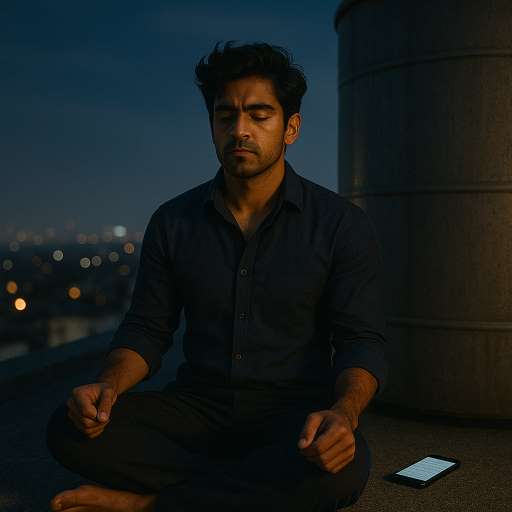
Motivational Quote: “You have to train your mind to be stronger than your emotions or else you will lose yourself every time.” The quote emphasizes the importance of mental fortitude in navigating life’s challenges. It suggests that developing the ability to manage emotions, rather than being controlled by them, is crucial for personal well-being and success.
Deeper Meaning of Motivational Quote
The quote, “You have to train your mind to be stronger than your emotions or else you will lose yourself every time.”
carries a deep message about mental discipline, emotional control, and self-mastery.
Here’s a breakdown of its meaning:
“You have to train your mind…”
- This implies mental strength doesn’t come naturally — like physical fitness, it requires deliberate practice, discipline, and consistent effort.
- “Training your mind” means developing focus, resilience, rational thinking, and emotional awareness.
“…to be stronger than your emotions…”
- Emotions are natural, powerful, and often impulsive. They can cloud judgment — leading to fear-based decisions, anger-driven reactions, or anxiety-induced paralysis.
- The quote encourages you to build a mind that can pause, observe, and respond, rather than simply react emotionally.
“…or else you will lose yourself every time.”
- If your emotions always overpower your thoughts, you’ll lose clarity, react destructively, or drift from your values and purpose.
- “Losing yourself” means being swept away by emotional storms—making decisions you regret, losing direction, or becoming someone you’re not.
In essence, if you don’t learn to control your mind, your emotions will control you—and you’ll keep losing peace, purpose, and self-respect.
Here’s a story inspired by Motivational Quote “You have to train your mind to be stronger than your emotions or else you will lose yourself every time.”
Motivational Story: “The Noise Inside“
The city never really slept, but tonight it screamed louder than usual.

The Rooftop Storm:
Arjun stood on the rooftop of his apartment building, eyes scanning the restless skyline of Mumbai. Below him, traffic roared and neon lights flickered like restless thoughts. The wind whipped around him, but it couldn’t drown out the storm inside.
Just hours ago, he had slammed the door of the office, fists clenched, breath heavy. Another argument with his manager. Another reminder that his hard work went unnoticed. Frustrated, tired, and feeling invisible, Arjun wanted to walk away — from the job, the pressure, and even himself.
But instead of heading to the pub with his friends or picking another fight, he had walked up here — alone. Because for once, he didn’t want noise. He wanted to listen.
The day had begun like any other — too early and too loud.
Emails piled up. Calls interrupted his focus. His idea in the meeting was barely acknowledged. But when his junior repeated the same thing five minutes later, it was applauded like genius. Arjun had swallowed his irritation, telling himself it wasn’t worth reacting to. However, the real blow came at 5:30 PM.

The Glass Door Slam:
“Arjun,” his manager said, “I expected more initiative from you on the Sharma project. You’ve been too passive.”
Passive? That word detonated something inside him. He had worked nights, skipped meals, and even missed his sister’s birthday for that project. The anger surged like a rising tide, hot and blinding.
He wanted to yell. Instead, he left — not before slamming the glass door so hard it shook.
This wasn’t the first time.
Ever since childhood, Arjun had battled the urge to react too quickly. When he failed a math test in school, he ripped the paper apart in front of the teacher. When a close friend once forgot his birthday, he ghosted him for two years.
Each time his emotions took over, something important slipped away — a friend, a mentor, or a piece of himself.
But over the years, he had started reading about self-awareness. Listening to podcasts on stoicism. Practicing breathing exercises. He wanted to change, to become more grounded.
Yet tonight reminded him: the training wasn’t done. Not even close.

Rooftop Reflection:
As Arjun stood staring at the glowing skyline, his phone buzzed. It was a message from his mentor, Mr. Iyer — a man who had once seen greatness in him when he couldn’t see it in himself.
“When emotions are loud, listen harder to your mind. Don’t run — retrain.”
Arjun read the message twice. Then sat down on the cold rooftop floor, back resting against the water tank.
He closed his eyes. And the conversation began — not with words, but with awareness.

Mirror of Two Selves:
The first thought that surfaced was: “I’m not respected. No one sees my effort.”
But instead of feeding that fire, he questioned it. Is that true? Or did I just want applause louder than patience today?
Then came the next wave: “I work harder than everyone else.”
Again, he paused. But do they see it? Or have I hidden it behind silence and resentment?
The thoughts kept coming, but now, he wasn’t reacting — he was observing. Breathing through them. Dismantling them piece by piece, like a craftsman smoothing rough wood.
By the time Arjun opened his eyes, the chaos inside had softened.
He stood up and walked downstairs — not to run, but to act differently.

Writing the Email:
Instead of firing off an angry resignation letter, he wrote a calm, detailed email to his manager: outlining what he had done, where he saw the project grow, and how he’d like clearer expectations in the future.
Then, instead of bottling up his energy, he opened his notebook and mapped out his goals for the next three months. Personal, professional, and emotional.
And finally, he called his sister. Not to apologize — but to listen. She laughed when she heard his voice.
“You sound… peaceful,” she said.
“I’m learning to be,” he replied with a smile.
Weeks passed.
At work, nothing changed instantly. But Arjun did.
He stopped reacting at every provocation. He listened more. When something upset him, he noted it down, reflected, then responded with clarity — not heat.

Walking Through the Office, Reborn:
Bit by bit, people began to notice. His manager called him in one day and said, “There’s a steadiness in you now. It’s impressive.”
But Arjun didn’t do it for the applause anymore. He did it for peace.
He realized something simple, something life-changing:
The world would never stop testing you. But if you train your mind, those tests become stepping stones — not stumbling blocks.
That night on the rooftop didn’t erase his emotions. It introduced him to their purpose.
They were signals, not commands.
And from that moment on, every time Arjun felt the storm rising, he reminded himself:
“Train your mind to be stronger than your emotions… or you will lose yourself every time.”
He had lost himself many times before. Now, he was learning how to come home.
Here is the ending of motivational story from the quote “You have to train your mind to be stronger than your emotions or else you will lose yourself every time.”
Moral of the Story:
True strength lies not in suppressing your emotions, but in mastering your response to them.
When you train your mind to think clearly and act with awareness — even in emotional moments — you gain control over your life, your choices, and your future.
Emotions are powerful, but if you let them lead, you may lose yourself. If you lead with a trained mind, you’ll find yourself — stronger, wiser, and unshaken.
To explore more on stories and dive into related ideas, be sure to check out the other posts where we cover all sort of stories related to quotes. Stay tuned for more…..
To explore more on quote topics, be sure to check out the other topics where we cover all categories of quotes. Stay tuned for more…..

